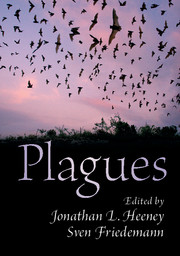Book contents
- Frontmatter
- Dedication
- Contents
- List of Figures
- List of Tables
- Notes on Contributors
- Foreword
- Preface
- Acknowledgements
- 1 Ebola: The Plague of 2014/2015
- 2 Plagues and History: From the Black Death to Alzheimer's Disease
- 3 Plagues and Medicine
- 4 The Nature of Plagues 2013–14: A Year of Living Dangerously
- 5 Plagues, Populations and Survival
- 6 Plagues and Socioeconomic Collapse
- 7 Silicon Plagues
- 8 The Human Plague
- 9 Plague as Metaphor
- Index
Foreword
Published online by Cambridge University Press: 24 March 2017
- Frontmatter
- Dedication
- Contents
- List of Figures
- List of Tables
- Notes on Contributors
- Foreword
- Preface
- Acknowledgements
- 1 Ebola: The Plague of 2014/2015
- 2 Plagues and History: From the Black Death to Alzheimer's Disease
- 3 Plagues and Medicine
- 4 The Nature of Plagues 2013–14: A Year of Living Dangerously
- 5 Plagues, Populations and Survival
- 6 Plagues and Socioeconomic Collapse
- 7 Silicon Plagues
- 8 The Human Plague
- 9 Plague as Metaphor
- Index
Summary
We associate plagues with epidemic diseases. The Darwin lecture series on Plagues was, by tragic serendipity, unwittingly launched on the eve of an erupting epidemic of humankind's most feared viral disease, Ebola. Little did we know that 2014 would be the start of the most serious single Ebola outbreak of our recorded history. It highlighted how plagues of such severe disease affect individuals in all layers of society, illustrating the frailty of human life with the unraveling of fragile health care systems, basic infrastructure, transportation and trade, leaving national economies on the brink of collapse.
Yet, the word ‘plagues’ has many more meanings. We explored these through the multidisciplinary approach used by the Darwin College Lecture Series, enriched by views of prominent scholars from very different fields. In this book the theme ‘plagues’ is portrayed not only by international experts of infectious diseases (vaccinology, biochemistry and medicine), but also from scholars in digital security, computational science, mathematical biology, ecology, genetics, history, economics, literature and theology. The result is a comprehensive spectrum of essays on plagues, from their impact on humanity to the animal kingdom, all bundled together in this one very unique book. It is another successful culmination of diverse perspectives on one such theme that the Darwin Lectures so uniquely weaves into one intellectually challenging topic.
Throughout history plagues have inflicted misery and suffering on humankind. Traces of these catastrophes are echoed in our literary past and, intriguingly, also encrypted and passed on through generations in our genes. Notably for the future of human population growth, the expansion of our species is challenging and changing the very environment we and other species require for survival on earth. We are also reminded that it may not just be the infectious plagues but also non-infectious ones that will impact this planet's species as this generation ages. The ever-expanding human population and our impact on climate threatens the delicate balance of ecosystems, making us a human plague to this fragile planet. Are plagues the manifestation of nature's checks and balances? This collection is a thought-provoking product of the topics of the 2014 Darwin College Lecture Series delivered by internationally renowned scholars, known not only for their outstanding work and literary talents, but for their ability to communicate the diverse facets and impacts of plagues.
- Type
- Chapter
- Information
- Plagues , pp. xviii - xxPublisher: Cambridge University PressPrint publication year: 2017

